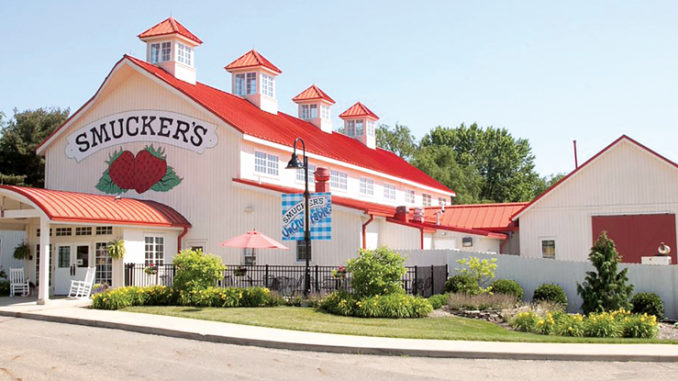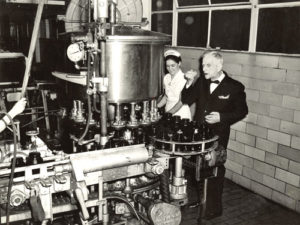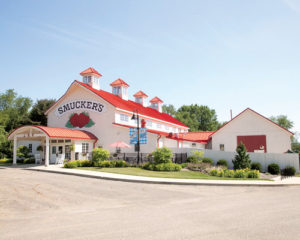
by Lynne Thompson

In 1897 Jerome Monroe Smucker began employing a delicious form of recycling at his small-town Orville cider mill. He used the pulp left after pressing apples to make apple butter. His success in selling the product door to door from the back of a horse-drawn wagon prompted him to expand into making apple and grape juices. In 1923 the business, incorporated as The J.M. Smucker Co., installed equipment to manufacture fruit spreads.
Over the next century the brand name Smucker’s became a household word, as synonymous with jams and jellies as Kleenex is with facial tissue. The company also adopted a unique marketing slogan, “With a name like Smucker’s, it has to be good,” a word play juxtaposing the company’s strange name with its delicious products. The company, still headquartered in Orville and family run, now employs 7,000-plus workers in over 30 locations across North America. In 2017 it posted $7.4 billion in net sales, the result of building an impressive lineup of brands that include everything from Jif peanut butter to Rachael Ray Nutrish and Dad’s pet foods, according to Amy Held, senior vice president of corporate strategy, mergers and acquisitions, and international.
“We think about how we can provide a full spectrum of opportunities in the categories [where] we play,” she says. “We believe that’s an important part in leading the category and making sure that the consumers have a full choice.” Those categories, she adds, are carefully curated. “We really focus on those that are leading, growing categories. They are categories that resonate with consumers today.”
The buying began in 1982 with the purchase of Magic Shell, a brand of squeezable topping that hardens on ice cream in seconds. It was a novel addition to the ice cream-topping line Smucker first introduced in 1940. Sixteen years later, the company acquired MenUSAver, maker of a frozen crustless peanut-butter sandwich. The item, rebranded Smucker’s Uncrustables, became a centerpiece in school lunches packed by countless hurried parents. It is so popular that Smucker is opening a Colorado facility devoted exclusively to its production this year.
“We’ve actually experienced double-digit, year-over-year growth in that product for 15 out of the last 18 quarters,” Held reports. “We really believe that that can be a $500 million business for us in the next three to four years.”

In 2002 the company bought the Jif peanut-butter and Crisco shortening-and-oils businesses from Cincinnati-based Procter & Gamble. Richard Smucker, co-CEO at the time of the transaction, said it would provide “significant cash flows when coupled with our already strong balance sheet” and “strengthen our position to acquire other complementary leading food brands, providing opportunity for greater top- and bottom-line growth.”
Held notes that acquisitions made over the last decade illustrate that strategy. For example, Smucker entered the lucrative coffee business in 2008 by buying Procter & Gamble’s Folgers coffee division, making it the owner of the top at-home java brand in the United States. Two years later, it reached an agreement with Green Mountain Coffee Roasters and Keurig, inventor of the single-serve K-Cup pod system, to introduce a line of Folgers K-Cups.
“We were one of their first branded partners,” she points out. And in 2015 the company began offering consumers a premium alternative by launching a line of K-Cups in partnership with Dunkin’ Donuts, now known simply as Dunkin’.
Similarly, Smucker immediately became a big dog in the booming pet-foods market with the 2015 purchase of San Francisco-based Big Heart Pet Brands, which included pet-parent staples such as Milk Bone, Meow Mix and Kibbles ’n’ Bits. Last year it acquired Ainsworth Pet Nutrition, Pittsburgh-area makers of the aforementioned Rachael Ray Nutrish and Dad’s brands.

But Held adds that Smucker still develops its own products. It continues to cultivate its coffee business by planning summer debuts of Folgers Noir, an addition inspired by the dark-roast trend, and a “super-premium” Dunkin’ Signature Series. The selection of 24 jams and jellies will increase in the next year with the rollout of Smucker’s Mosaics, fruit-spread blends (think strawberry-blackberry) inspired by customers’ desire for new flavor profiles. Held is particularly enthusiastic about Jif Power Ups, a line of “creamy clusters” and “chewy bars” that exploit another growing consumer category: snacks, particularly more healthful grab-and-go ones.

“We’ve brought in a number of new [Jif] users, which really shows again, if [we] keep the consumer first, what we can do around brands that consumers love to help lead category growth,” she says.



